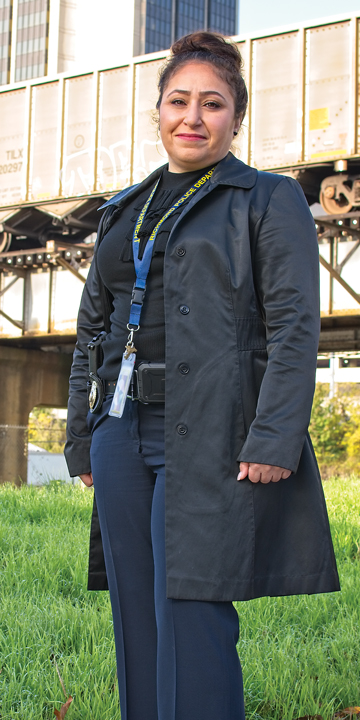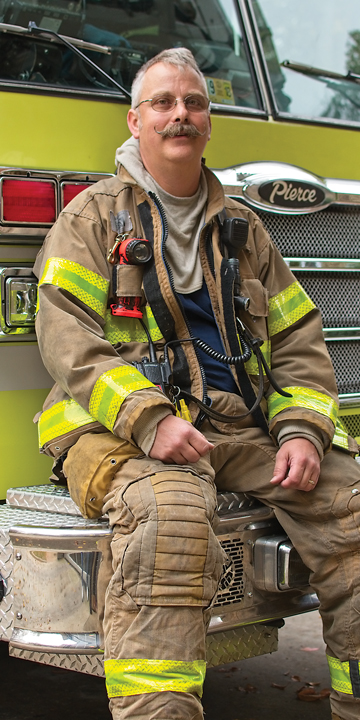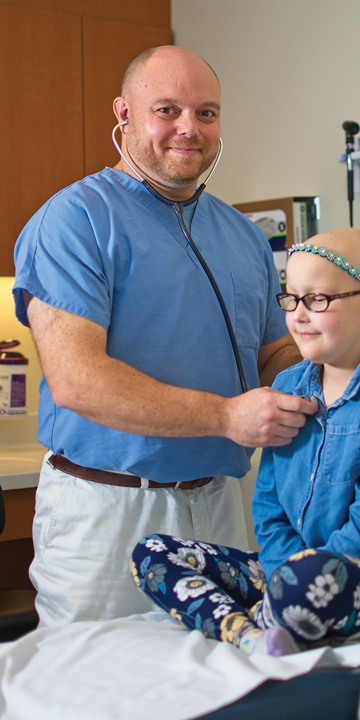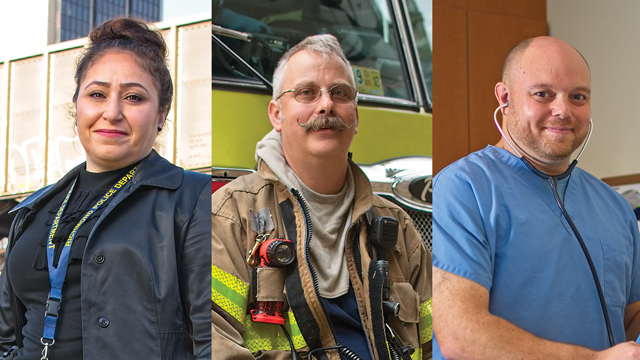Maybe it’s just me, but I feel like our first responders – police, fire, medical, and so many of the people who help our families at times of great need – can go unnoticed. Their work and their dedication to the community often fly under the radar. People are inclined to think these folks are just doing their jobs, but it’s so much more than that.
I should know. Six years ago, when I woke up in the middle of the night and realized my husband was in distress, I panicked and reached for the phone to dial 911. Firefighters from Station 15 in Henrico were there in minutes, helping my husband through a seizure and doing their best to calm me down. Turned out, my husband was suffering from brain cancer. During the eighteen months that he lived after that first traumatic night, he fell at home several times. Once again, the firefighters came within minutes to help him up and to check him out each time. They were our heroes.
These kinds of heroes put their hearts into community service every day, often laying their lives on the line to help our families. And it’s important to remember that, especially in today’s world and during this time of year. This holiday season, I would like you to meet three people who are making the world a better place for all of us. They are our neighbors, our friends, and our allies. Keep reading and get to know some of Richmond’s everyday heroes!
 Searching for Truth Police Detective Amira Sleem
Searching for Truth Police Detective Amira Sleem
Detective Amira Sleem feels a surge of adrenaline each time she begins a death investigation. As a homicide detective with the Major Crimes Division of the Richmond Police Department, she encounters tragic situations on a regular basis. “You can’t bring these people back, but you have a different kind of power because it’s now in your hands,” she says. “You have the power to find out the truth.”
Early in her life, Amira never considered law enforcement a career she would embrace. Born in Lebanon and now fluent in Arabic, she came to the United States with her family as an infant. She spent the bulk of her childhood in Fredericksburg and moved to Richmond to study biology at Virginia Commonwealth University. She wanted to be a doctor, but “life happened,” she says. “I didn’t graduate, and I started dabbling in other jobs.”
She was trying to pull together enough money to enroll in the nursing program at Bon Secours when a neighbor who worked for the Richmond Capitol Police persuaded her to apply as a support officer there. “I would have believed you faster if you told me I would get shot up into space,” she says about going into law enforcement.
When she attended Rappahannock Regional Criminal Justice Academy in Petersburg, she didn’t know what to expect. It was a whole new world “and I loved it!” she says.
Even though she felt intimidated by the power she had to take someone’s freedom away, she really liked the human aspect of her work. “I call it customer service on someone’s worst day,” she says. “You are facing a human being and seeing the rawness of that person. You see sides to people you would never see on your average job.”
After three years with the Capitol Police, she applied to the Richmond Police Department. She completed the Police Department Training Academy in 2005 and is now a firearms instructor there and a master shooter. Amira learned her shooting skills under the mentorship of former Richmond Police Range Master Jerry Keefer, who continued to help her hone her skills long after the academy. Her first assignment was as a patrol officer on the midnight shift at the Fourth Precinct on Chamberlayne Avenue. “That’s when I started realizing I like figuring out things,” she says. “I like talking to people.”
She worked as a uniformed officer for three years and progressed to the detective division, then the major crimes division, and finally homicide in 2012, working out of police headquarters on Grace Street. She is currently the only female homicide detective in the Richmond force.
Kind and empathetic, Amira forms close relationships with the families involved when she’s working a case. “You see what they are going through,” she says. “It’s a huge responsibility to be the person sitting in front of that family and saying ‘I am doing the best I can do to find out what happened.’”
She meets these families on their worst days. She sits in their living rooms and witnesses the “deepest, darkest pain they can experience in knowing someone they loved has perished,” she says.
The moment is raw, honest, and quiet. “Death is so quiet. A death scene is not what people make it out to be. It’s such a sad moment,” she says.
As part of her job, she has to notify family members at all hours of the day and night. The circumstances in each case vary. “You have to allow that family member to go through the emotions and shock in front of you,” she says.
It’s important to Amira that she maintains her professionalism as well as a comfortable distance. “You have a specific role to play. You have no right to share in that pain,” she says. “You have to understand from that moment that you have a relationship started around the job you have to do.”
Solving a case is often bittersweet because she knows not every person is a “bad person, but they may have made some bad decisions.” She adds, “But don’t get me wrong, you also have your evil out there.”
Her true gratification comes from knowing her work has delivered results and that by knowing the truth, “the family can have some peace,” she says.
When she’s on a case, her schedule is relentless. She often clocks in 18- to 24-hour days just trying to chase down the evidence. When she can unwind, time is spent with family and friends. “Many of my friends don’t do the same work, and I need to visit the real world once and a while,” says Amira.
She doesn’t believe her work should define her. “People will say to me that there’s nothing about me that says cop – and a lot of times, I say thanks. I guess I am doing something right to keep that realistic aspect,” she says.
Even though her days are often filled with the pain and hurt of others, she takes pride in knowing she did something about that hurt when she could. “You start appreciating the simple things in your own life,” she says. “You can never forget that.”
 Answering the Call Firefighter Bruce Ivey
Answering the Call Firefighter Bruce Ivey
Dealing with children in a true emergency situation is heartbreaking for Henrico firefighter Lieutenant Bruce Ivey. “Just recently, my shift lost a child on a call. That’s hard, especially when you have your own children,” says Bruce, who’s the father of two teens – Jacob, seventeen, and Evelyn, fourteen. “Over time, it adds up on you.”
He remembers one call years ago that his shift responded to when his children were very young. There was a report of three children trapped by the fire. All of the children were unconscious. Bruce and his crew performed CPR on all three, and Bruce accompanied one of the kids on the ambulance ride to the hospital.
“We were able to save one of the children,” he says. “I vividly remember saying a prayer in my head that they would be okay while I was fighting a lump in my throat and tears in my eyes just to get the job done. The next day, you go home and hug your kids a little tighter and a little longer,” he says.
Bruce fell in love with firefighting in high school when he volunteered for his local fire department in West Chester, Pennsylvania. After graduation, he enlisted in the military and became a firefighter in the Air Force, serving at Diego Garcia, a base on an archipelago in the Indian Ocean, during Desert Storm.
When he finished active duty in May 1994, he applied to fire departments in Virginia and Maryland, including the Henrico County Division of Fire. More than one thousand other candidates applied, and only twenty-three – including Bruce – were admitted. “I had five interviews where I did not get the job,” he says.
Bruce graduated from the Henrico Fire Academy in 1994, and was one of the ten members of his class who was accepted in the department.
He started his career at Station 2 on Darbytown Road and worked on the water rescue/dive team for almost four years. After receiving specialty training to become a certified rescue diver and swift water rescue technician, he moved to his current position at Station 1 on Azalea Avenue.
The station has a technical rescue team that deals with everything from rope rescues to building collapses countywide and regionally. “That meant more training and certification,” says Bruce, who serves as a lieutenant on the ladder truck. “It took about four years to get to the level of technical rescue technician.”
Ten technical rescue technicians at the station – Bruce is one – are also on the Federal Emergency Management Association’s Urban Search and Rescue Task Force at Virginia Beach. Bruce and six others were sent to Puerto Rico to help out after Hurricane Maria devastated the island in September.
The team conducted targeted searches and responded to calls for rescue evacuations. “What was hard for us in Puerto Rico was not being able to do more to help these people, and wanting to stay even longer to help more,” he says. “Everybody we ran into was thankful we were there.”
At work, Bruce never knows what the day will bring. He works 24-hour shifts – seven shifts every three weeks – averaging fifty-six hours a week. The long days, as well as heading out on calls in the middle of the night, can be physically and mentally exhausting. But they are nowhere as challenging as what the firefighters face on a call.
“Sometimes, we’re seeing people who don’t specifically need our help on an emergency level, but do need non-emergency help,” he says. “There is a huge need for services to help the mentally ill or some of the poorer families who are scraping by. We see that on a regular basis.”
At home in Bon Air, Bruce, his wife, Lara, and their children are very involved in their community. Bruce’s son is an Eagle Scout like his father was when he was in high school, and his daughter is a Girl Scout.
Service is important to the Ivey family. He and his son have shaved their heads four years in a row to help St. Baldrick’s Foundation raise money for childhood cancer research. His daughter shaved her head to raise money for the Cameron Gallagher Foundation this summer. “She raised over $14,000,” Bruce says. “Supporting her doing that effort has been a lot of fun!”
 Finding a Healthy Perspective Nurse Practitioner Tom Brunner
Finding a Healthy Perspective Nurse Practitioner Tom Brunner
Nurse practitioner Tom Brunner of Children’s Hospital of Richmond at VCU works with kids and families when they are at their most vulnerable and their lives are in chaos. “Every day is something new and a way to have an impact and make a difference in the lives of these kids and their families,” he says. “You have to blend critical thinking with disease process, and balance that with a sense of compassion and understanding of what our kids and families are going through.”
The first time he served as a primary nurse, his patient was a 3-year-old with leukemia. He saw what she had to endure – all the chemotherapy and the medications. When kids have cancer, Tom knows how the hospital becomes their second home for the first six to eight months of treatment.
“That gave me perspective on what these families are going through and what we can do at the hospital to help families navigate hearing that difficult phrase, ‘your child has cancer,’” he says.
He thinks of that first young patient as the spark that ignited his desire to help children with cancer on a regular basis. That little girl is now an “amazing young woman,” he says. “She has done well over the years.”
Tom tries to relate to children on their level when he’s working at their bedside. “I take time to talk with them as a person and not just as a patient. I share things about myself and my family with them,” he says. “I think it’s hard for them to feel like normal children when they are here in the hospital. I have fun with them and smile with them. I treat them like any other child – anything I can do to make them feel like normal kids who are not going through this.”
Tom started in the nursing program at VCU in 1996 after graduating from William & Mary with a degree in psychology and working in that field for eighteen months. “I realized I needed something hands-on,” he says. “I knew I wanted to work with kids in the field of nursing. It seemed like a great fit.”
He began his nursing career in 1998, and in 2001, became a nurse practitioner. He was first assigned to the acute care pediatric floor. After three years, he began working with pediatric sickle cell patients. He left VCU to teach in the nursing program at Reynolds Community College, but returned to VCU to work as the pediatric clinic coordinator.
Last month, Tom started his new position as the nurse practitioner for pediatric oncology, working specifically with kids battling cancer.
“That has been my passion throughout my career working with kids, first sickle cell disease and now kids with cancer,” he says. “Right now, I am working with children who have brain tumors.”
He never thought about the field of nursing when he was in high school and college even though his mom and several aunts were nurses. He still believes that many young men don’t consider nursing because it’s often viewed as a field for women. “With the amount of technology and science in the work and the compassionate care that goes into nursing, it all can fit into the male idea of what a career can be,” he says, adding that nursing is a second career for many of the male students going through the nursing program. “It’s rare to have younger male students. I would like
to change that.”
When he’s not at the hospital, Tom spends some of his time renovating his home in Bon Air where he lives with his wife, Mary Jo, and their three sons: Joe, fifteen; Max, seven; and Sam, three. He has renovated two homes previously, and he sees that type of work as an outlet.
“It’s rewarding to work in an emotionally draining atmosphere at the hospital, and then come home and knock down walls and run pipe for plumbing,” he says. “Nursing has offered me the flexibility in my schedule to do some of these side passions.”




